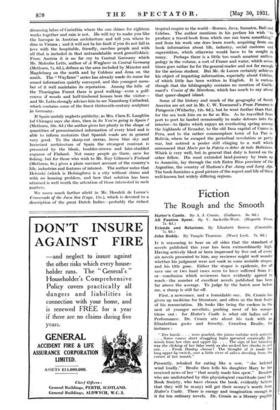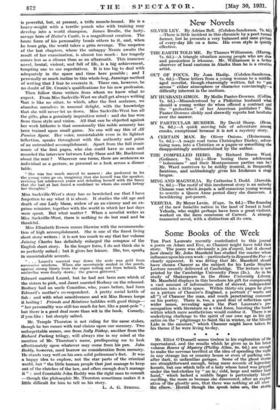Fiction
The Rough and the Smooth
Hatter's Castle. By A. J. Cronin. (Gollancz. 8s. 6d.) Friends and Relations. By Elizabeth Bowen. (Constable. 7s. 6d.) John Boddy. By Temple Thurston. (Ward Lock. 7s. 6d.) IT is reassuring to hear on all sides that the standard of novels published this year has been extraordinarily high.
Having actively liked or been impressed by five out of even• six novels presented to him, any reviewer might well wonder whether his judgment were not sunk in some amiable stupor, and his title gone. Either the stupor is epidemic, for all save one or two hard cases seem to have suffered from it: or—conclusion which reviewers have evidently agreed to reach—the number of excellent novels published has been far above the average. To judge by the batch now before me, a slump is still far off.
First, a newcomer, and a formidable one. Dr. Cronin has given up medicine for literature, and offers us the first fruits of his renunciation. He looks like being the cuckoo in the nest of younger novelists, pushing most of his compe-
titors out : for Halter's Castle is what old ladies call a Performance. Dr. Cronin sets about his task with an
Elizabethan gusto and ferocity. Grandma Brodie, for instance : " Her hands . . . were gnarled, the joints nodular with arthritis . . . Some coarse short straggling hairs sprouted erratically like weeds from' her chin and upper lip. . . . The sign of her brooding was the clicking of her false teeth as she sucked her cheeks in and out. . . . Fresh Dunlop cheese ! The thought of it made her long upper lip twitch, cent a little river of saliva drooling from the corner of her mouth."
Presently, rebuked for eating like a sow, " she belched wind loudly." Brodie then tells his daughter Mary he has received news of her " that nearly made him spew." Readers who are undisturbed by this physiological exactitude (and the Book Society, who have chosen the book, evidently believe that they will be unity) will get their money's worth front Hatter's Castle. There is energy and imagination enough in it for ten ordinary novels. Dr. Cronin as a literary pugilist is powerful, but, at present, a trifle muscle-bound. He is a heavy-weight with a terrific punch who with training may develop into a world champion. James Brodie, the lusty, savage hero of Hatter's Castle, is a magnificent creation. The brute force of his personality bends others to it, and, when he loses grip, the world takes a grim revenge. The suspense of the last chapters, where the unhappy Nessie awaits the result of her examination, is almost too much : her tragedy comes less as a climax than as an aftermath. This immense novel, brutal, violent; and full of life, is a big achievement, tempting one to use superlatives. It is too big to deal with adequately in the space and time here possible ; and I personally so much incline to this whole-hog, Jennings method
of writing that I fear to overrate it. There can, however, be no doubt of Dr. Cronin's qualifications for his new profession.
Then follow three writers from whom we know what to expect. From Miss Sackville-West we shall get always writing that is like no other, to which, after the first sentence, we abandon ourselves in unusual delight, with the knowledge that she will never -let us down. Miss Sackville-West has all the gifts, plus a genuinely inquisitive mind : and she has won from them style and vision. All that can be objected against her work hitherto is that occasionally this noble armoury has
been trained upon small game. No one will say this of All Passion Spent. Her voice, unmistakable even in its lightest inflection, speaks throughout with the authority and poise of an untroubled accomplishment. Apart from the full ironic music of the first pages, who else could have so seen and recorded the interview between Lady Slane and Mr. Bucktrout about thereof ? Wherever one turns, there are sentences as individual as a gesture, as personal as a look across a dinner table.
" She was too much moved to answer : she preferred to let the young voice go on, imagining that she herself was the speaker, reviving her adolescent years and deluding herself with the fancy that she had at last found, a confidant to whom she could betray her thoughts."
Miss Sackville-West's story has so bewitched me that I have forgotten to say what it is about. It studies the old age and death of one Lady Slane, widow of an ex-viceroy and an ex- prime minister, together with the world in which her last days were spent. But what matter ? When a novelist writes as Miss Sackville-West, there is nothing to do but read and be thankful.
Miss Elizabeth Bowen comes likewise with the recommenda- tion of high accomplishment. She is one of the finest living short story writers : it is not too much to say that her volume Joining Charles has definitely enlarged the compass of the English short story. In the longer form, I,do not think she is so perfectly suited ; but it gives her leisure. She, too, speaks in unmistakable accents.
. . . Laurel's married way down the aisle ,was, gold from successive windows. When she uncertainly smiled in the porch, against strong blasts from the organ rolling out from behind, the umbrellas were- finally down ; the graves glittered."
Edward married Laurel, but he had not been sure which of the sisters to pick, and Janet married Rodney on the rebound. Rodney had an uncle Considine, who, years before, had been Edward's mother's co-respondent. A pretty social kettle of fish : and with what sensitiveness and wit Miss Bowen keeps it boiling ! Friends and Relations bubbles with good things- " her personality was still too much for her, like a punt-pole " : but there is a good deal- more than wit in the book. Comedy, if you like : but sharply salted.
Mr. Temple Thurston is not riding for the same stakes, though he too comes with real claims upon our memory. Two unforgettable scenes, one from Sally Bishop, another from 'the Richard Furlong trilogy, will always rise in my mind at the mention of Mr. Thurston's name, predisposing me to look affectionately upon whatever may come from his pen. John Boddy, hmieVer, need borrow no consideration froth memory. He stands very well on his own solid policeman's feet. It was
a happy idea to explore, not the star parts of the criminal world, but " the little human people that just manage to keep out of the clutches of the law, and often enough don't manage it " : and Constable John Boddy was the right man to consult —though the philosophic. Mr. Thurston sometimes makes it a Little difficult for him to tell us his story.
L. A. G. STRONG.







































 Previous page
Previous page